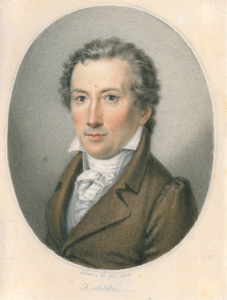Lament
(Poet's title: Klaglied)
Set by Schubert:
D 23
[1812]
Meine Ruh ist dahin,
Meine Freud ist entflohn;
In dem Säuseln der Lüfte,
In dem Murmeln des Bachs
Hör ich bebend nur Klageton.
Seinem schmeichelnden Wort
Und dem Druck seiner Hand,
Seinem heißen Verlangen,
Seinem glühenden Kuss,
Weh mir, dass ich nicht widerstand.
Wenn ich von fern ihn seh,
Will ich ihn zu mir ziehn;
Kaum entdeckt mich sein Auge,
Kaum tritt näher er mir,
Möcht ich gern in mein Grab entfliehn.
Einmal, ach, einmal nur
Möcht ich ihn glücklich sehn
Hier am klopfenden Herzen,
An der sehnenden Brust:
Wollte lächelnd dann untergehn! –
My peace is gone,
My joy has flown off,
In the murmuring of the breezes,
In the babbling of the brook,
Trembling, I only hear the sound of lament.
His flattering words
And the pressure of his hand,
His hot desire,
His glowing kiss,
What pain because I did not resist!
If I see him from a distance
I will draw him to me.
As soon as his eye discovers me
As soon as he comes nearer to me
I will happily fly to my grave.
Just once, oh, just once,
I would like to see him and be happy,
Here at my pounding heart,
At my longing breast,
Then I would die smiling.
All translations into English that appear on this website, unless otherwise stated, are by Malcolm Wren. You are free to use them on condition that you acknowledge Malcolm Wren as the translator and schubertsong.uk as the source. Unless otherwise stated, the comments and essays that appear after the texts and translations are by Malcolm Wren and are © Copyright.
☙
Themes and images in this text:
Chest / breast Eyes Graves and burials Hands Hearts Heat Kissing Laments, elegies and mourning Rivers (Bach) Wind
This speaker appears to have been abandoned, not just by a lover but by peace and joy too. All calm has disappeared, and joy has ‘flown away’. The poetic I is left as a hearer rather than a listener. Breezes and brooks appear to sing only laments.
However, there is no such thing as ‘passive’ experience. It is the character’s memory and inner life that is constructing this very song of lament. The failure to resist the lover’s advances was itself an action. Words were not just spoken and heard but interpreted as meaningful and valuable. The pressure of a hand and the heat of a kiss were experienced as mutual interaction.
In contemplating the future, the speaker links passive ‘seeing’ with active ‘pulling’. There will be movement. I imagine him noticing me and approaching me. I will want to fly off into my grave. This flying off is active (in contrast to the more passive experience of joy flying off, Mein Freud’ ist entflohn, in stanza 1). Presumably this flight towards the grave is not a flight away from, but in the direction of, the lover.
To what extent this text is a paraphrase or a rewriting of Goethe’s Gretchen am Spinnrade (D 118) is unclear. Early readers could hardly have failed to notice the similarities.
☙
Original Spelling Meine Ruh' ist dahin, Meine Freud' ist entflohn; In dem Säuseln der Lüfte, In dem Murmeln des Bachs Hör' ich bebend nur Klageton. Seinem schmeichelnden Wort Und dem Druck seiner Hand, Seinem heißen Verlangen, Seinem glühenden Kuß - Weh' mir, daß ich nicht widerstand! Wenn ich von fern Ihn seh, Will ich ihn zu mir ziehn; Kaum entdeckt mich sein Auge, Kaum tritt näher er mir, Möcht' ich gern in mein Grab entfliehn. Einmal, ach, einmal nur Möcht ich ihn glücklich sehn Hier, am klopfenden Herzen; An der sehnenden Brust; Wollte dann lächelnd untergehn! -
Confirmed by Peter Rastl with Glycine von Friedrich Rochlitz, Erster Theil, Züllichau und Freystadt, bey Darnmann, 1805, pages 213-214; and with Allgemeine Musikalische Zeitung. Achter Jahrgang vom 2. Oktober 1805 bis 24. September 1806. Leipzig, bey Breitkopf und Härtel. [Den 22ten Januar. №. 17. 1806.] pages 259 – 260.
To see an early edition of the text, go to page 259 [Erstes Bild 151] here: https://download.digitale-sammlungen.de/BOOKS/download.pl?id=bsb10527956


